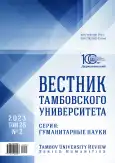The development of educational autonomy in the conditions of group work on the author’s electronic manual on a remote educational platform
- Authors: Dashkina A.I.1
-
Affiliations:
- Peter the Great Saint Petersburg State Polytechnic University
- Issue: Vol 28, No 2 (2023)
- Pages: 347-361
- Section: THEORY AND METHODS OF FOREIGN LANGUAGE TEACHING
- URL: https://journal-vniispk.ru/1810-0201/article/view/297990
- DOI: https://doi.org/10.20310/1810-0201-2023-28-2-347-361
- ID: 297990
Cite item
Full Text
Abstract
Importance. Learning autonomy should be developed for a number of reasons. Firstly, educational technologies paved the way for students’ independent cognitive activities. The second reason is the paradigm shift brought about by social and political changes: nowadays students are more focused on their own educational progress than on teamwork aimed at helping their peers. Thirdly, since groups of learners are getting bigger, students do not get enough practice in class, so they need to learn to work autonomously so that they can follow the syllabus.The objective of the study is to develop the students’ skills of learning autonomy as well as foreign-language communicative skills by organizing teamwork on an online platform.Materials and methods. The subjects of the experiment were 70 freshmen and sophomores majoring in linguistics from Peter the Great Saint Petersburg State Polytechnic University. The purpose of the experiment was to determine whether teamwork is conducive to the development of students’ learning autonomy and whether their collaboration on a distance learning platform contributes to acquiring foreign-language speaking skills.Results and Discussion. In the exposure groups, where the students did their home assignment in small teams on a distance learning platform, the scores for the final conversational task were better than those in the reference groups, where the students working on a distance learning platform were not divided into teams, and where the teacher helped the whole group do their home assignment. On top of that, the levels of learning autonomy in the exposure groups were higher than those in the reference groups.Conclusion. The novelty of the study lies in the fact that we used a number of existing academic papers to develop the assessment criteria for linguistic majors’ foreign-language conversational skills. In addition, we designed a questionnaire for assessing the level of learning autonomy. The experiment allowed us to establish that teamwork is the best way to organize foreign-language practice on an online platform because each student has more time to develop conversational skills and to learn to work autonomously than in an EFL class where the teacher works with the whole group.
About the authors
A. I. Dashkina
Peter the Great Saint Petersburg State Polytechnic University
Author for correspondence.
Email: wildroverprodigy@yandex.ru
ORCID iD: 0000-0003-0081-0604
PhD (Education), Associate Professor, Associate Professor of Higher School of Engineering Pedagogy, Psychology and Applied Linguistics
29 Politekhnicheskaya St., St. Petersburg, 195251, Russian FederationReferences
- Goloshumova G.S., Chernova O.E., Timirov F.F., Ezhov K.S. (2017). Developing students’ autonomy. Pedago-gicheskoe obrazovanie v Rossii = Pedagogical Education in Russia, no. 8, pp. 27-32. (In Russ.) https://doi.org/10.26170/po17-08-04, https://elibrary.ru/zegyih
- Kolesnikov A.A. (2019). Samostoyatel’naya rabota pri obuchenii inostrannomu yazyku v usloviyakh uchebnoi avtonomii [Independent work in teaching a foreign language in the conditions of educational autonomy]. Inos-trannye yazyki v shkole = Foreign Languages at School, no. 9, pp. 2-11. (In Russ.) https://elibrary.ru/xgmhao
- Shershneva V.A., Danilenko A.S., Kosmidis I.F. (2016). Learning autonomy of students in modern educational paradigm. Vestnik KGPU im. V.P. Astaf’eva = Bulletin of Krasnoyarsk State Pedagogical University Named After V.P. Astafyev, no. 3 (37), pp. 106-110. (In Russ.) https://elibrary.ru/wvoxjp
- Nasonova E.A. (2010). Analiz interpretatsii ponyatiya «uchebnaya avtonomiya» [Analysis of interpretations of the concept of “educational autonomy”]. Izvestiya vysshikh uchebnykh zavedenii. Seriya: Gumanitarnye nauki = News of Higher Schools. Series “Humanities”, vol. 1, no. 2, pp.145-149. (In Russ.) https://elibrary.ru/neiilz
- Dorontsova O.A. (2016). Interpersonal interaction of subjects of education process in the context of formation of autonomy of teenagers. Pedagogicheskoe obrazovanie v Rossii = Pedagogical Education in Russia, no. 2, pp. 137-142. (In Russ.) https://doi.org/10.26170/po16-02-20, https://elibrary.ru/vtldaz
- Tsirkunova S.A. (2013). Developing student autonomy in an EAP context. Vestnik IGLU [Bulletin of Irkutsk State Linguistic University], no. 4 (25), pp. 289-294. (In Russ.) https://elibrary.ru/rtrzuv
- Yakovleva A.N., Dmitrieva S.A. (2017). Development of educational autonomy of students in the process of foreign language learning. Vestnik Chelyabinskogo gosudarstvennogo pedagogicheskogo universiteta = Herald of Chelyabinsk State Pedagogical University, no. 4, pp. 113-118. (In Russ.) https://elibrary.ru/yselgv
- Tarabarina Yu.A. (2021). Foreign language communicative competence assessment of undergraduate students of non-linguistic specialties. Baltiiskii gumanitarnyi zhurnal = Baltic Humanitarian Journal, vol. 10, no. 1 (34), pp. 274-280. (In Russ.) https://doi.org/10.26140/bgz3-2021-1001-0063, https://elibrary.ru/tsesfh
- Kharlamenko I.V., Nokhrina V.V. (2018). Criteria for assessing oral English exam at B2 level. Vestnik Moskovs-kogo universiteta. Seriya 19. Lingvistika i mezhkul’turnaya kommunikatsiya = Moscow State University Bulletin. Series 19. Linguistics and Intercultural Communication, no. 2, pp. 102-109. (In Russ.) https://elibrary.ru/xmzwbn
- Rogozneva E.M., Sanina V.V. (2012). Research on learning autonomy of modern university students under the condition of informatization of society. Vestnik TvGU. Seriya «Pedagogika i psikhologiya» [Bulletin of Tver State University. Series: Pedagogy and Psychology], no. 3, pp. 279-285. (In Russ.) https://elibrary.ru/ozixmh
- Kerr Ph., Jones C. (2012). Straightforward Upper Intermediate Student’s Book. London, Macmillan Education Publ., 175 p. Available at: https://pdfslide.net/documents/straightforward-upper-intermediate-students-book.html?page=1
- Dashkina A.I., Soloshenko M.A., Sosnina M.N., (2022). Vanicheva M.N. Formirovanie rechevogo komponenta inoyazychnoi kommunikativnoi kompetentsii u studentov mladshikh kursov lingvisticheskikh spetsial’nostei [Development of the Speech Component of Foreign Language Communicative Competence Among Junior Students of Linguistic Specialties]. St. Petersburg, Peter the Great St. Petersburg Polytechnic University Publ. (In Russ.) https://doi.org/10.18720/SPBPU/5/tr22-24
Supplementary files








